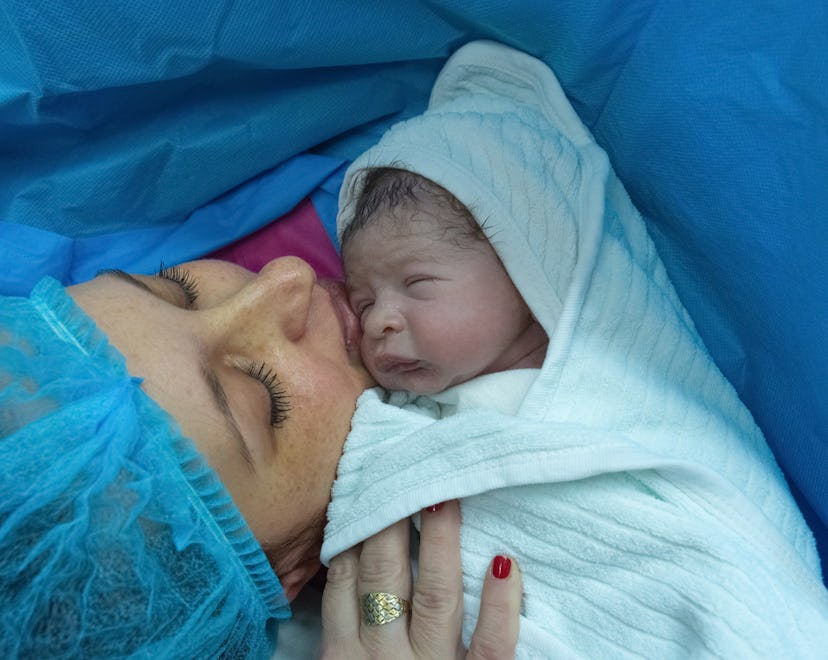C-Sections

Here's What Your Midwife Can Do For You During A C-Section
Their role is to support you no matter what.
As a pregnant person, you have options when it comes to how you give birth — and more importantly, who helps you deliver your child. You could always go with a standard OB-GYN, or you might want a midwife by your side as you labor and bring baby into the world. Still, unforeseen things can happen, and a complication could arise. But can a midwife perform cesarean section surgery? They can help in many other ways.
Can a midwife perform a C-section?
Hopefully your labor and delivery will go as planned, but there are several reasons why you might need to have an emergency intervention due to complications such as fetal distress, placental abruption, or cord prolapse, to name a few. When it comes to the actual C-section surgery, that’s outside of the scope of a midwife, according to Dr. Megan Gray, M.D., an OB-GYN at Orlando Health Physician Associates. “Midwives are not trained to perform cesarean sections,” says Gray. “It is a major abdominal surgery that requires hundreds of hours of practice to perform safely; OB-GYN physicians train for four years after medical school to perform cesarean sections.”
So what training does a midwife have?
While they might not be trained to specifically perform C-sections, a midwife can help with labor and vaginal deliveries. “Midwives who work in hospitals are trained to care for healthy, low-risk women,” Risa Klein, CNM, OB-GYN, NP, MS, the Director of Midwifery at Lenox Hill Hospital in New York City tells Romper. “Hospital midwives are certified by the AMCB, American Midwifery Certification Board and have attended accredited universities.” When a pregnant person needs medical help beyond the scope of the midwifery model of care, a midwife can make referrals, consult, and help co-manage their patients in the event of a medical situation for either the mother or baby that would warrant the assistance of an obstetrician.
What is the midwife’s role during a C-section?
Whether you need a scheduled or emergency C-section that requires an OB-GYN, your midwife will still be right there to help. “In the event a cesarean delivery is medically needed, the midwife will be with the patient during her prep for the cesarean, and during the procedure and into the recovery room,” says Klein. “Once the baby is born and evaluated by either a pediatrician, pediatric nurse practitioner or nurse, the midwife brings the baby to the mother for breast/chest feeding and bonding right on the operating room table, and holds the baby for the mom so she has continuous contact with her newborn until it is time to go to the recovery room once the procedure is completed.” The goal is to create a calm, bonding experience with the entire team (including the anesthesiologist, obstetrician, midwife, operating room staff and nurses) for the birthing parent.
Can a midwife help with a C-section?
In addition to providing constant care for a laboring patient, a midwife might, in some cases, also be a second set of hands during the C-section, too. “In some hospitals, midwives can assist in C-sections,” Dr. Cheruba Prabakar, M.D., an OB-GYN tells Romper. “They might be responsible for holding back retractors or suctioning blood during the surgery.” Klein concurs, adding: “Some midwives have taken courses to be the first assist at a cesarean section delivery. These midwives are trained to assist the primary obstetrician, working alongside if certified as a first assist.”
While every birthing scenario differs, if you have the option, you might prefer your midwife to be by your side during the surgery. “The midwife and her client have previously established relationships of trust during the course of her prenatal visit, so the continuity of care in the operating room makes all the difference for a woman to feel well cared, not only with her midwife, but with her entire team in the operating room, the recovery room, and with her postpartum nurses,” says Klein. And that’s particularly important for the birthing parent, since you might not know the OB-GYN performing your surgery. Says Prabakar: “There may be a doctor doing the C-section who the patient has never met before, since it will be the person on staff that day.”
If a pregnant person wants to have a midwife, what happens if an OB-GYN is needed?
Let’s say that you’re laboring at home with your midwife when you need an OB-GYN stat. Don’t stress; your midwife will be right there to get you the help you need. “Most midwives will have a relationship with an OB-GYN doctor who acts as a backup for the midwife in the case that complications arise then the OB-GYN doctor will be asked to step in and care for the patient,” says Gray.
While a midwife can educate, care, and help to keep a pregnant person calm during labor (and deliver a baby during a vaginal delivery), there are some limitations as to what they can do, especially when it comes to a C-section. So while a midwife can’t perform a C-section, they can help with the surgery to continue caring and advocating for the birthing parent as they bring their baby safely into the world.
Sources interviewed:
Dr. Megan Gray, M.D., an OB-GYN at Orlando Health Physician Associates.
Risa Klein, CNM, OB-GYN NP, MS, the Director of Midwifery at Lenox Hill Hospital in New York City
Dr. Cheruba Prabakar, M.D, an OB-GYN